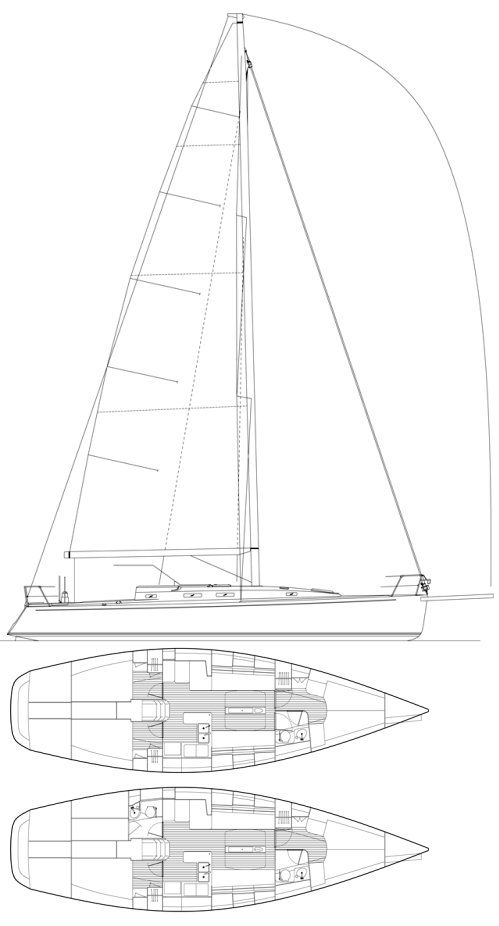The J/133, a distinguished performance cruiser, embodies J Boats' philosophy of crafting yachts that excel equally on the racecourse and in comfortable cruising. Conceived by the renowned in-house design team of J Boats, including Rod Johnstone, and built by J Boats in partnership with TPI Composites, the J/133 quickly established itself as a versatile and capable vessel. Launched with the aim of setting a new standard for cruiser/racers, the J/133 promises enhanced speed and enjoyment with a reduced crew, making it appealing to a broad spectrum of sailors.
J/133 Information, Review, Specs

- Make
- Model
- Number Built
- Production Year(s)
- 2006 - ??
The J/133 officially began its production run in 2006, though it garnered significant recognition, including "Boat of the Year" accolades, as early as 2004, highlighting its immediate impact on the sailing world. As part of the J Boats lineage, the J/133 reflects Rod Johnstone's overarching design philosophy of producing stable, forgiving, and durable boats that offer accessible performance. J Boats, in collaboration with TPI Composites in the United States, leveraged advanced fiberglass construction techniques to build the J/133, ensuring a robust yet lightweight hull. This construction approach aligns with the builder's long-standing commitment to quality and performance, a hallmark since the company's inception with the J/24.
The design goals for the J/133 were ambitious: to create a powerful sailing yacht that offered genuine cruising comfort. It was envisioned as a vessel capable of both competitive inshore racing and comfortable offshore passages. Unlike many yachts that compromise performance for interior volume, the J/133 aimed to deliver the best of both worlds, focusing on spirited sailing characteristics while still providing a well-appointed living space. No significant model variations, such as MkI or MkII versions, are commonly noted, emphasizing a consistent design throughout its production.
Sailing Performance and Handling
The J/133's design ratios underscore its performance-oriented nature. With a Sail Area to Displacement (SA/D) ratio of approximately 22.8, the J/133 exhibits excellent power, suggesting strong performance in light air conditions. Its Ballast to Displacement (B/D) ratio of around 0.39 indicates a good degree of stiffness, allowing the boat to stand up to its rig in heavier winds and maintain a more comfortable motion. Furthermore, a low Displacement to Length (D/L) ratio of about 153 classifies the J/133 as a lighter, more performance-focused vessel for its size.
Anecdotal reports consistently praise the J/133 as a light and responsive boat that is a joy to sail. Its fine entry, flat canoe body, and modest beam contribute to a lean waterline, which enhances its speed and agility. The yacht is renowned for its powerful sailing capabilities and has proven its mettle in demanding races, including being described as a "superstar" in events like the Rolex Fastnet. Despite its performance pedigree, the J/133 is also noted for being easily handled by a small crew, even as few as two people, thanks to its well-balanced helm and generously sized, high-aspect rudder that provides excellent control. It is considered an effective all-around design, performing well both inshore and offshore, and is strong enough for blue-water sailing while maintaining speed in lighter breezes.
Accommodations and Layout
The interior of the J/133 is designed to offer a blend of comfort and practicality, achieving a spacious feel within a performance hull. The yacht features a notable 6 feet, 4 inches of headroom throughout the main cabin, contributing to an airy and open ambiance. J Boats offered the J/133 with two primary accommodation plans: a standard three-cabin layout and an optional two-cabin configuration. The standard arrangement typically includes three private sleeping cabins along with a dual-entry head. In the two-cabin version, the aft port stateroom may be replaced by a second head.
The interior aesthetic is described as handsome and elegant, with a "no-nonsense New England fashion." The joinerwork is well-executed, featuring varnished cherry veneered bulkheads and furniture, complemented by cold-molded varnished trim. The fore and aft cabins are typically finished in off-white.
The U-shaped galley, while noted as being on the smaller side, offers sufficient counter space for meal preparation and includes a high-polished double stainless steel sink. The main cabin features settee berths with bolstered backrest cushions to port and starboard, providing comfortable seating and additional sleeping capacity. Cabins offer double berths, full-length shelves, and hanging lockers, with berths designed to be adult-length at 6 feet, 4 inches long and 5 feet, 10 inches wide at the head. A legitimate navigation station is incorporated, complete with a chart table large enough to accommodate full-sized charts, a testament to the boat's cruising intentions. Storage is enhanced by lifting cabin-sole boards, providing easy access to hull spaces.
Measurements
Construction & Hull
- Construction Material
- Fiberglass (Solid)
- Hull Type
- Monohull Sailboat
- Keel Type
- Bulb
- Rudder
- 1x Spade
- Ballast
- 7250 lbs (Lead)
- Displacement
- 18520 lbs
- Water Capacity
- 24 gal
- Fuel Capacity
- 12 gal
Engine
- Engine Make
- Yanmar
- Engine Model
- —
- Engine Type
- —
- Engine HP
- 56
- Engine Count
- 1
- Drive Type
- —
- Fuel Type
- Diesel
Rig & Sails
- Rig Type
- Fractional Sloop
- P (Main Luff)
- 54 ft
- E (Main Foot)
- 18.6 ft
- I (Foretriangle Height)
- 56.99 ft
- J (Foretriangle Base)
- 17.26 ft
- Forestay Length (est)
- 59.55 ft
- Main Sail Area
- 502.2 sqft
- Foretriangle Sail Area
- 491.82 sqft
- Total Sail Area (Reported)
- 994 sqft
- Total Sail Area (Calc)
- 994.02 sqft
Dimensions
- LOA
- 43 ft
- LWL
- 37.83 ft
- Beam
- 12.75 ft
- Draft
- 7.5 ft
- Max Headroom
- -
- Air Draft
- -
Calculations
- Hull Speed
- 8.24 kn
- Pounds per Inch Immersion
- 1